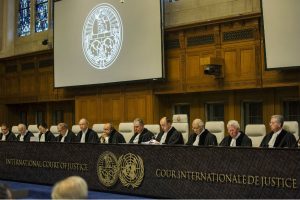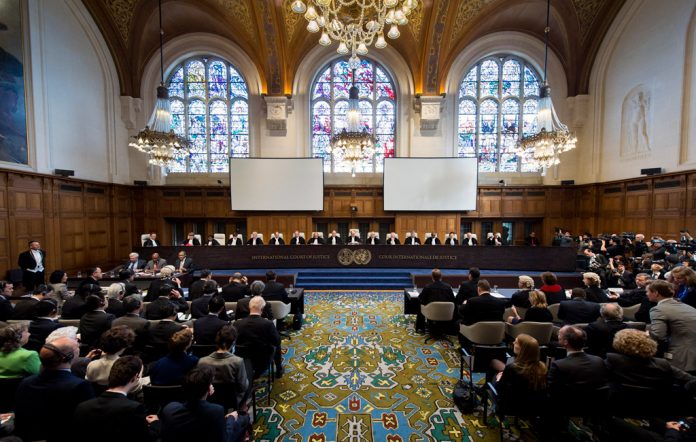INTERNATIONAL COURT OF JUSTICE
Introduction:
- The judicial branch of theUnited Nations (UN) is named as International Court of Justice.
- Its seat is in thePeace Palace in The Hague, Netherlands;
- ICJ settles legal disputes which the states submit to it and also provides advisory opinions on legal questions duly authorized international branches, agencies, and theUN General Assembly, when submitted to it.
- It was established in June 1945 and started working in April 1946.
- History:
- The International Court of Justice is based on the Permanent Court of International Justice which was an institution under the League of Nations and was dissolved in 1943.
- With the intention of extension of the jurisdiction of the PCIJ , the assembled committee e eventually agreed to create a new court altogether having central judicial authority of the United Nations and in the world.
- The ICJ was hence formed though belonging to the U.N Charter but with its statute based on that of the PCIJ.

III. Role and Function of ICJ:
The Court has two functions:
- Settling legal disputes, in accordance with international law, submitted by States, and.
- Providing advisory opinions on legal questions referred to it by authorized UN organs and specialized agencies.
- Composition:
- The Court is composed of 15 judges.
- Judges are elected for terms of office of nine years by the UN General Assembly and the Security Council.
- It is assisted by a Registry, its administrative organ.
- Official Language:
Its official languages are English and French.
Jurisdiction:
Contentious Jurisdiction:
If, the jurisdiction of ICJ is based upon the mutual consent of the parties is known as the contentious jurisdiction.
Compulsory Jurisdiction:
Art. 36(2) of the Statute of ICJ extend the jurisdiction of ICJ. The state parties to the present statute may at any time recognize as compulsory the jurisdiction of ICJ in all legal disputes concerning;
- Interpretation of any treaty
- any question relating to international law,
- the existence of any fact amounting to breach of an international obligations and
- the nature or extent of reparation (damages) to be made for any breach of an international obligation.
- Advisory Jurisdiction:
ICJ while exercising in its advisory jurisdiction the Court may render advice to the General Assembly, Security Council or any member state as the case requires.
VII. Current Members:
President: Ronny Abraham (France)
Vice-President: Abdulqawi Ahmed Yusuf (Somalia)
Judges:
- Hisashi Owada (Japan)
- Peter Tomka (Slovakia)
- Mohamed Bennouna (Morocco)
- Antônio Augusto Cançado TrindadeBrazil)
- Christopher Greenwood(United Kingdom of Great Britain and Northern Ireland)
- Xue Hanqin (China)
- Joan E. Donoghue (United States of America)
- Giorgio Gaja (Italy)
- Julia Sebutind(Uganda)
- Dalveer Bhandari(India)
- Patrick Lipton Robinson(Jamaica)
- James Richard Crawford(Australia)
- Kirill Gevorgian(Russian Federation)
VIII. Popular Cases:
- Recently the Court in its advisory jurisdiction decided the Legality of wall built by Israel case.
- In Nicargua case (1986) ICJR, the ICJ held that it is a basic principle that the consent of the state parties to a dispute is the basis of the court jurisdiction in contentious cases.
- Barcelona Traction, Light and Power are pretty famous for establishing that there are obligations that are owed erga omnes.
- Further in Nicaragua vs. Honduras(1988) ICJR the ICJ held that the existence of jurisdiction was a question of law and dependent upon sole the intention of the parties.
- Where does ICJ meet?
Peace Palace in the Hague, Netherlands.
- When the disputes/cases are referred to the ICJ?
When requested by states to resolve legal disputes.
- What kind of cases/disputes does ICJ hear?
Cases involving legal disputes between submitted parties are heard by ICJ.





